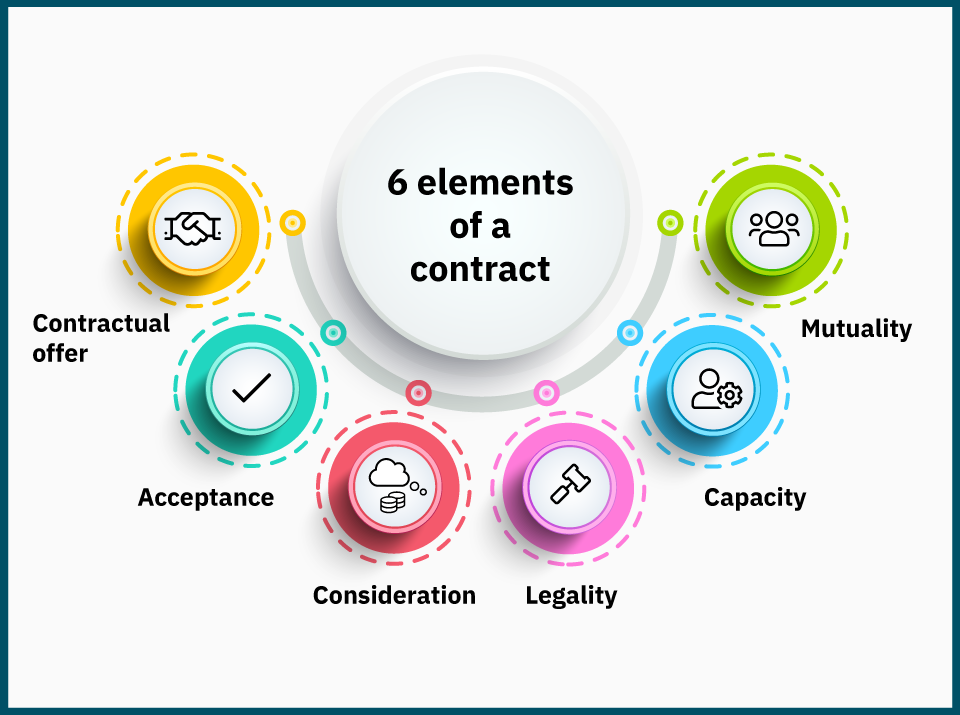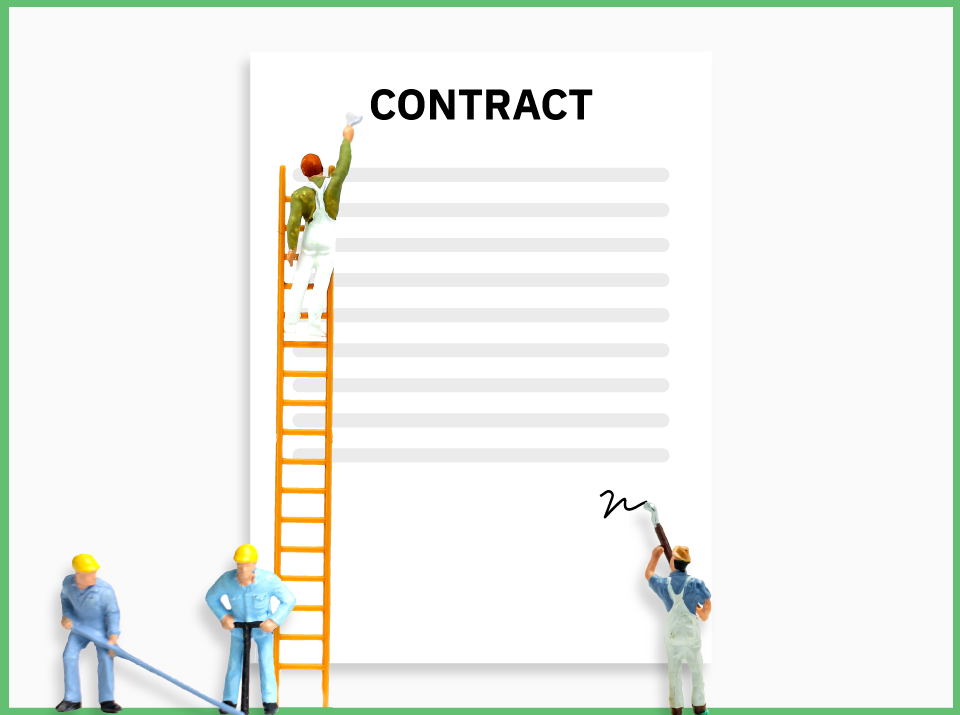The business world today functions in a codependent ecosystem. Multiple parties join hands to ensure smooth operations and achieve the ultimate goal of meeting customer needs. But what makes these parties hold to their original offers?
A stable business relationship frequently seeks to rely on formal documents called contracts. It lists the obligation of specific performances agreed between the parties. Only when the parties accept the terms of the offer and sign, the deal becomes a legally binding contract.
Why is it essential to have a written contract?
Contracts can be written or verbal. Oral contracts are usually formed on the basis of mutual understanding. Enforcing these contracts can be a challenging task. A reasonable person might find it difficult to prove any contract breach in a court of law within a reasonable time. Therefore, it is often advised to avoid verbal agreements if possible.
Whereas contracts in the form of written documents record each and every term and provision agreed upon by the parties. This assures certainty and instills a sense of security that the transaction will be completed as per the binding agreement. In case of any breach, the written document can be used as a reference point to claim for any damages or losses.
| Automate your contract workflows seamlessly! Try Revv today! Sign up for free |
Six essential elements to be included in a contract
Simply agreeing to the terms and signing the dotted line does not validate a contract’s enforceability. Under the common law, it is proof of the mutual agreement. Therefore, it is critical that a contract is drafted keeping in mind all the essential terms that make it valid. The contract becomes a point of reference throughout the deal term.
For example, if there is a breach of contract, the aggrieved party will reach out to the court and seek compensation for the damages & losses by holding the other party liable. But to do so, they will have to provide proof that there exists a valid contract between the two of them.
Here are some essential elements of a contract that must be included to prove its enforceability, legality, and validity –

1.Contractual Offer
The most basic element of any contract is established on the idea of want and fulfillment. Someone wants something, and someone else has the capability to fulfill it. This forms the basis of an offer. It includes the duties and responsibilities that the offeror (the one making an offer) complies to abide by. Only when the offeree (to whom the offer is made) accepts it, that the agreement becomes a binding contract. Most of these offerings are promised in exchange for the value that can either be money or a desired action or outcome.
An offer can be rejected directly or by making a counteroffer which automatically invalidates the initial offer. If there is no rejection, then the contract goes on unless insanity or death strikes either party.
The contract can also be revoked by an offeror when either of the condition is met –
- It is done before the offeree accepts it
- The offeree must be informed that the order is getting revoked
If the offeree accepts the offer, then the promise needs to be fulfilled as per the agreed terms.
2.Acceptance
This action is required from the offeree when they must decide whether to accept or reject the offer. By accepting it, they willingly agree to abide by the terms of the offer. But there are a few things to keep in mind to ensure that the acceptance is valid –
- The offeree knows and accepts the offer on their own without any undue influence
- They have the intent to get into the contract
- Their acceptance is expressed through words, deeds, or performance
The offer must be accepted within a reasonable time as there are chances of it getting revoked. While some offers are accepted only when the offeree performs certain obligations like they need to make the payment before availing a particular service or product. These are called unilateral contracts. Whereas a bilateral contract includes promises of both parties to perform. Sales agreements are a good example of a bilateral contract.
Can inaction or silence to an offer be treated as acceptance?
This usually depends on how the terms have been discussed between the parties. If it is agreed in their prior dealings, then silence will be taken as an acceptance. In another way, when a silent party acts upon the offer without any response, it is considered as acceptance. For example – If Mr. Y delivers food to you and you eat it, this means you have acted upon the offer without a response which makes the contract valid. Now you must comply and pay for the food as per the terms.
| Draft, manage, track, and automate the entire contract lifecycle! Try Revv today! No Credit Card Required |
3. Consideration
The exchange of offer and acceptance is the main subject matter of any agreement. The product or the service offered is the consideration for a promisee. Whereas a certain sum of money from the sale of goods or an agreed action or outcome is the desired consideration for a promisor.
There are certain agreements where one of the parties might induce forbearance to provide immediate consideration but rather promise to provide value at a future date. When the other party performs an obligation based on such promises, they can enforce promissory estoppel. This states that the promise is enforceable by law even if it lacks formal consideration.
Only when an act is done voluntarily that it may not include consideration. For example, You voluntarily helped your elderly neighbor to mow her lawn and she paid you $5 for it. If you do that same thing next week, she is not legally bound to pay you for it.
4. Legality
This essential element is critical to ensure that the terms of the contract are compliant with the contract laws. These documents are subject to jurisdiction-specific law, where the parties perform their obligations.
The purpose of a contract should be legal for it to be valid. For example – If you get into a contract with someone and ask them to steal a car in exchange for a considerable amount of money. This will not constitute a valid contract due to the illegality of the intent. This makes the proposed contract null and void.
5. Capacity
The party you enter into an agreement with must have the contractual and legal capacity to sign on the dotted line. Contractual capacity or competency means that the person is legally capable and does not belong to this particular group, which consists of a minor, mentally disabled, or intoxicated person. These groups of people lack the capacity to get into an agreement.
Even if you do get into a contract with someone who does not qualify, the contract will be termed voidable from inception as there are chances of an agreement taking place due to undue influence. The person who does have the contractual capacity can end the contract or allow it to move forward.
6. Mutuality
Mutuality, also referred to as mutual assent or meeting of the minds, confirms that the parties to the contract clearly understand and agree to the terms of the contract. This helps to counter the issues of misrepresentation and ensures that both parties are bound to the agreement. Even if one party is not bound, the contract becomes void.
Keep in mind these six essential elements of a contract to ensure validity and enforceability. When you are drafting different types of contracts, be mindful to manage your own legal obligations assuming that the other party will hold up their end of a deal that is favorable to them.
| Optimize your company’s Contract Processes and close contracts faster Try Revv – The best contract management software |
What is the purpose of drafting a contract including all the essential elements?
The purpose of drafting a contract can be viewed from different perspectives. The seller or the service provider would expect the contract to be structured with clauses that ensure value return for their offerings. Whereas the customer might draft an enforceable contract that gives them confidence.
Here are some reasons for drafting a legal contract –
- Clearly outline the expectations – A contract is a give and take relationship that clearly lists the expectations both parties have from each other, i.e., what the seller must provide, when and where should it be delivered, how must the customer pay, when is the due date, etc. This keeps them in the same boat and helps set up the best deal possible.
- A record of certainty and commitment – It is written proof of a business relationship. They are legally binding and enforceable in a court of law. It provides certainty that both parties will comply with their obligations as agreed upon.
- Reference document in case of disagreements – There are high chances of disagreements when multiple parties work together on a project. Having the expected tasks listed down in one place becomes a quick reference point. It also helps in case of a dispute as separate legal provisions are laid down to help resolve disagreements in the best way possible.
The purpose of a contract is to act as a tool that structures relationships and builds foundations for key business alliances. Read this contract guide to know about the contract types and parts of a contract.
| Want to take the hard work out of drafting contracts? Try Revv’s contract templates |
Give contract drafting a head start with templates

As discussed above, having a written contract is always beneficial but drafting it can be a challenge. An ideal contract must contain all the essential elements, ensure that the offerings are conveyed clearly to the customer, and is easy to read and understand.
In order to simplify the contract creation process and empower teams and businesses to churn out perfect documents quickly, they should try and leverage templates. Document automation tools like Revv offer a plethora of templates available for use in their template library.
Here are some benefits that you can enjoy –
- Less prone to error & omissions – These ready-to-use templates are drafted and vetted after taking considerable legal advice from professionals. This ensures minimal errors. If you draft a contract from scratch, you might miss out on critical clauses, but a standard template will have all the necessary details in place. You just need to add basic information and customize it as per your company’s brand guidelines.
- Ensures consistency and standardization – Multiple teams and resources usually end up creating different contracts, if not in terms of content but from a visual perspective. They might change the sequence of components or don’t follow the suggested brand guidelines. This creates confusion. A template helps to standardize the contract layout. This makes it easier to share documents across the organization for consultations, reviews, feedback, and approvals.
- Faster contract churn out – Using templates save you from undertaking a rigorous review process and going through multiple iterations. This helps save time and lets you focus on other priority tasks.
- Fully customizable – The templates can be leveraged as is or customized to suit your needs using our feature-rich document editor. It’s highly functional, seamless, and UI-friendly. With a simple drag-and-drop option, you can add/edit texts, insert images, connect your Google Sheets, integrate your payment systems, and more. Even if you have a set template handy, upload the same to our platform in Word or PDF format, and make further modifications and enhancements using the editor.
| Looking to draft, manage, track, and automate the entire contract lifecycle! Revv is your best bet. No Credit Card Required |
Ease up your contract management process with Revv
Having an all-inclusive solution that can take care of your entire contract lifecycle is as important as having the right content in your contract. Revv is not just a platform for templates but a holistic solution that facilitates complete document management and eSignature capabilities.
With Revv you can do more:
- Seamless integration possibilities with all your business platforms like Zoho, Google Drive, Zapier, Slack, Box, etc.
- Regardless of the size or complexity, mapping data from business platforms is faster, and more accurate, with Data Studio feature.
- Collaborate in real-time with your teams using the Notes feature. Tag the concerned team member with @mentions and add Public/Private Comments specifying what action they need to take on the contract. The tagged person will receive an email notification for the same.
- Revv’s Activity tab provides real-time recipient activity monitoring and helps to make informed decisions.
- While sending contracts for electronic signature, users can choose to add one more layer of protection to mitigate risk by choosing OTP authentication for the signer. Through this feature, the signer/recipient can sign the contract only when they enter the OTP number received on their mobile phone.
- Recipients can also give a personal touch while signing their contracts. Revv provides flexible eSigning options for the signers to personalize their signatures. They can draw signatures, scan and upload signatures, choose from pre-formatted text styles, and even connect their crypto-wallet MetaMask to complete the signing process.
- All eSigned contracts in Revv generate Evidence Summary reports. They are basically legally binding audit trails of your contracts. It chronologically records all the contract activity that has happened till eSigning, including the IP addresses of the devices of signers and people who have accessed the contract document.
- Revv is a cloud-based platform that makes it easier for its users to access any document from any device and sign them from anywhere, at any time.
- Collect instant, online payments by integrating with payment systems like Stripe within your contracts
Bonus: Revv will assist you at every step of your contract journey. Here are some of our self-help videos that can navigate your contract creation process.
1. Create business contracts & documents and email it
2. Integrate google sheets into your contracts and documents
3. Create your own templates and use it
Draft your next valid contract
As you now know, your job doesn’t end with just drafting contracts with the right kinds of elements. There are multiple workflows, processes, and other factors to depend on for a contract to be valid. When working on your next contract, empower your teams with highly efficient and cost-effective document management and eSignature software like Revv and make the overall process simpler and faster.
Leverage contract templates and other features that Revv has to offer and be on top of your contract game!



